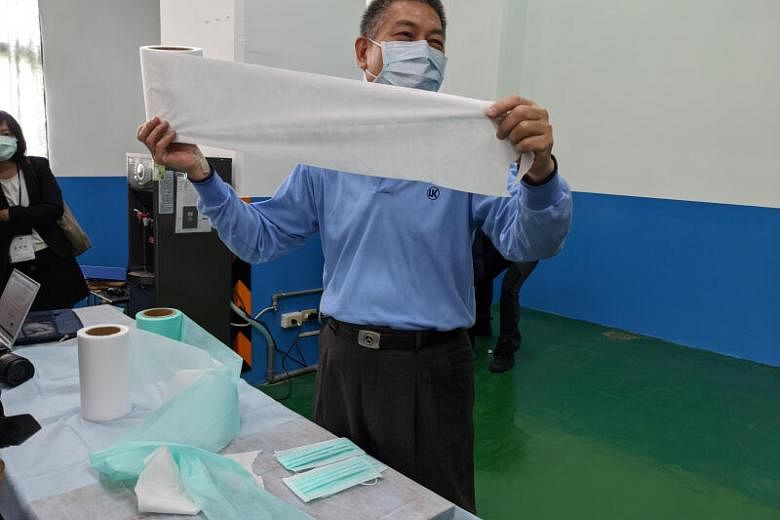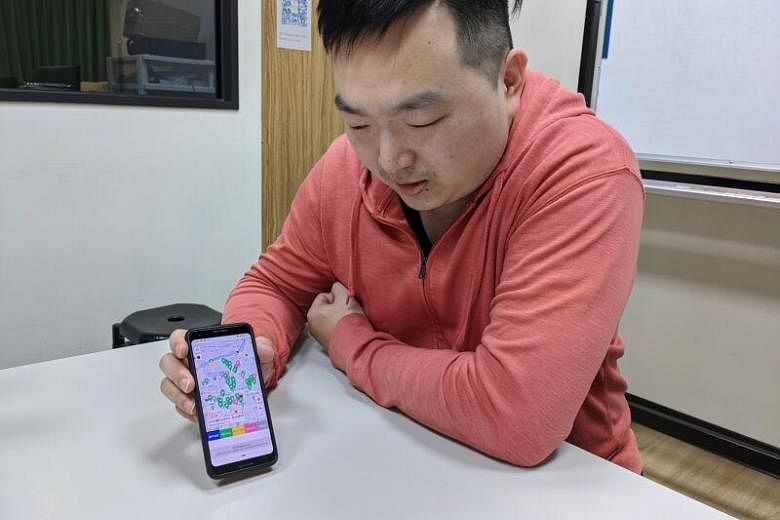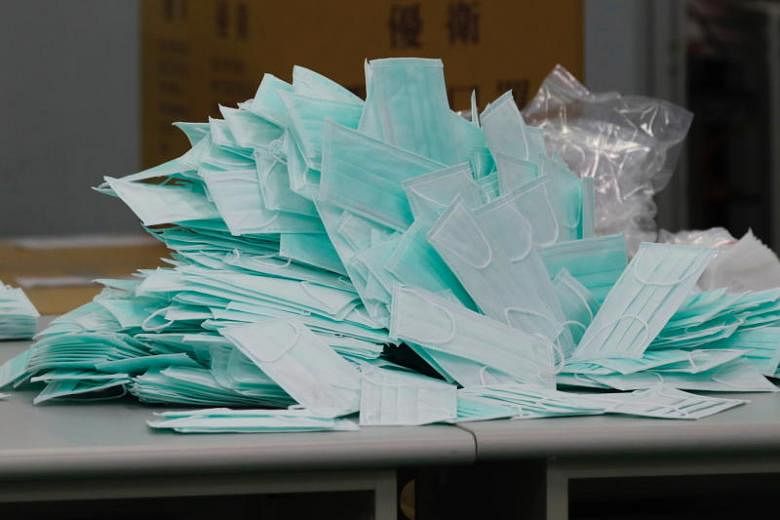TAINAN - Taiwan has scrambled to ramp up mask production and is also set to implement an online distribution system to ensure Taiwanese can get hold of the precious commodity, as the rest of the world grapples with a shortage of surgical masks used to protect against coronavirus.
Starting from Thursday (March 12), Taiwanese will be able to purchase masks online, and pick them up at convenience stores, said Health and Welfare Minister Chen Shih-chung on Tuesday.
The latest online system is in line with the current mask rationing policy which Taiwan's Central Epidemic Command Centre (CECC) has implemented since Feb 6.
Under the rationing system, every Taiwanese can buy three masks per week, and they have to show their national health insurance ID cards when making the purchases at pharmacies. The pharmacies will scan the IDs to check each customer's mask purchase records.
The authorities introduced the online system after receiving complaints from workers and students who were unable to queue up at pharmacies early in the morning to get their hands on the masks.
"The online purchases will not affect the number of masks sold at pharmacies," said Ms Wang Mei-hua, Vice-Minister of Economic Affairs, at the CECC press conference on Tuesday.
The CECC has prepared seven million masks per week for the new online system, which is estimated to be enough for 2.33 million people per week. Taiwan has a population of about 24 million people.
The price for the masks will be the same as those sold at pharmacies, which is NT$5 (23 Singapore cents) each.
The masks will be available for pick-up at the convenience store of the customer's choice between March 26 and April 1, and an additional NT$7 processing fee will be charged for each order.
As of this week, factories throughout Taiwan are producing a total of one million masks a day.
The government banned mask exports on Jan 23 and tasked mask factories to operate 24/7 to ensure Taiwan can supply its people with masks, after import numbers were affected by mask shortages in many countries.
GOVERNMENT-ACQUIRED EQUIPMENT, COMPANIES TO PAY EVENTUALLY
Universal Incorporation, a major Taiwan non-woven fabric manufacturer, was one of the factories that the government commissioned to help with mask production in late January, after the Covid-19 outbreak first emerged in mainland China late last year.
The company had also helped increase Taiwan's mask inventory during the Sars (severe acute respiratory syndrome) epidemic in 2003, said plant manager Chen Ching-feng.
"The government had installed three production lines then, and recently they installed five more," said Mr Chen, who supervises a 70-person production crew that is split between two 12-hour shifts.
The three lines installed during the Sars outbreak were used only twice each year because Taiwan imports most of its masks in normal times.
The government has ordered machinery for 90 production lines to be built and installed in various factories across the island. These production lines are built using the recently approved budget to help cope with the virus outbreak, but the factories will eventually have to buy the equipment from the government after the epidemic is over.
Mr Chen Ching-feng said the company is optimistic about transitioning into regular mask manufacturing after the mask shortage and virus outbreak are under control.
"We'll still be making masks afterwards because people have seen what it's like to not have enough masks; they'll want to stock up once there is enough to go around for everyone," he added.
Among Mr Chen's 70-person crew, 30 are soldiers dispatched by the government to help with mask packaging, and another 10 are volunteers from Buddhist foundation Tzu Chi.
"I've had factories from Hong Kong approach me, saying they want to buy fabric for the masks, but the government has banned fabric export as well," said Mr Chen Ching-feng.
OPEN DATA RESOURCES
The government's use of open data that allows both customers and pharmacies to keep track of who already purchased masks and how many masks each pharmacy has in stock has also helped in the more equitable distribution of the highly sought-after item.
Software engineer Howard Wu designed an interactive map using Google GPS and Place API that relied on Taiwanese' real-time reports to show how many masks were available in late January.
Within a day of the map's debut which went viral, Mr Wu received a shock - an NT$600,000 bill from Google for using Google GPS.
"The next day, Ms Audrey Tang reached out telling me that open data will be used in a new version of the mask map," said Mr Wu, who served as a consultant for this second interactive map. Google later waived the NT$600,000 fee, as the map was used to help people cope with the virus outbreak.
Digital minister Audrey Tang and a group of Google engineers worked with pharmacists who shared mask inventory data on their respective pharmacies so that Taiwanese can see if they have a chance at buying masks before heading out.
"Because of the open data, over 1,000 engineers were able to create over 100 projects that would keep people informed on mask inventory all across Taiwan," Mr Wu said.














